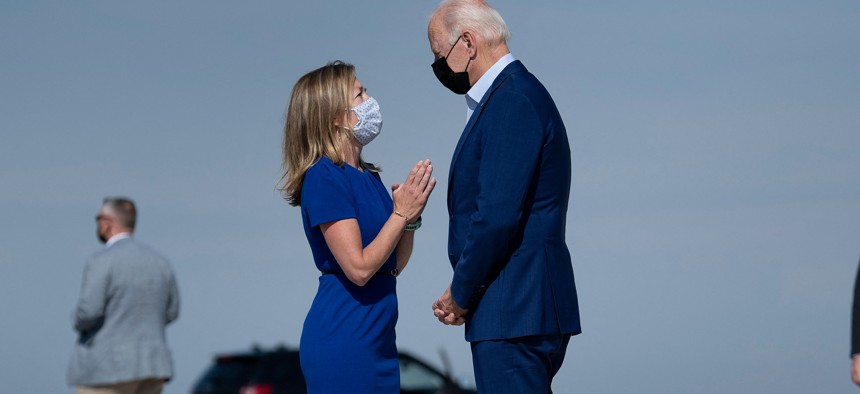Mayor Details Alarming Public Harassment of Her and Her Family

Boise Mayor Lauren McLean meets with President Biden last fall. GettyImages/BRENDAN SMIALOWSKI
Boise, Idaho Mayor Lauren McLean described the threats and intimidation she and other city staff have dealt with during the past two years. She said she wouldn’t step down but understands why many public servants are calling it quits.
Boise, Idaho’s Mayor Lauren McLean in a lengthy statement this week raised alarm about an explosion of threats and harassment endured by her and other local officials around the country, saying that staff in her city have been "exposed to escalating cruelty for nearly two years."
"This trend of violent intimidation has resulted in a wave of officials stepping away from public service, which puts our entire democracy in danger," McLean said in her roughly 900 word statement.
The mayor said that she and her family have experienced all kinds of threats—including crowds gathering with torches and pitchforks outside their home and "more sinister thwarted plots and serious threats" that she said she finds difficult to talk about.
A dedicated security detail has been added at Boise City Hall and accompanies the mayor on most days, she said. "I no longer run the trails alone before daybreak as I’ve done for 24 years. I don’t walk alone to work or hop on my bike whenever I like," she added.
But McLean, who has worked in government for 20 years, also said she would not resign from her post in Idaho's biggest city, which has about 235,000 residents. "I’ve decided, with my family, that we won’t back down, and that I’ll continue to serve this city I love," she said.
[Mayor McLean's full statement can be found here]
Disturbing National Trend
What McLean described mirrors a disturbing rise in threats directed towards state and local officials—politicians and career staff alike. About 87% of local leaders surveyed for a National League of Cities report last year said they'd seen an increase in attacks on elected officials in recent years, while 81% said they'd experienced harassment, threats and violence themselves.
Opposition to pandemic-related health policies, including mask mandates and business closures, no doubt fueled many of the hostile incidents during the past two years. This can be traced to the early days of the pandemic, like when heavily armed protestors entered into the Michigan state Capitol in May 2020. Or the alleged plot that emerged later that year to kidnap the state's governor.
More recently, school board officials have faced death threats and the public disclosure of their personal information online amid opposition to mask mandates in schools and how children are taught about the history of the nation's racial injustices.
Election officials have been met with threats as well, particularly after former President Donald Trump and his allies falsely pushed a narrative that he had lost in his reelection bid to President Biden due to fraud and malfeasance at the polls.
There were also episodes linked to protests over policing and racial injustice that crescendoed in 2020. Protesters calling for police reforms at times gathered outside the homes of mayors and other public officials. Portland, Oregon, Ted Wheeler, decided to move after sustained demonstrations outside his building that year.
Violence and threats directed at local officials surely predates the pandemic, such as when an armed man went on a rampage with a bulldozer in a small Colorado town in 2004 after a dispute over a sewer hookup, or in 2008 when a man in Kirkwood, Missouri shot and killed six local officials at city hall.
The NLC report blames several factors for the latest trend, including political polarization, the spread of misinformation and social media.
In Boise, McLean recounted city staff processing mail with "violent threats parroting the language and name-calling employed by local conflict profiteers and the factions they’ve radicalized."
The NLC report notes several elected officials who reported attacks and threats, including:
- Bolingbrook, Illinois Mayor Roger Claar. Claar's home was vandalized and he was likened to a Nazi due to his support for former President Trump.
- Minnetonka, Minnesota Councilmember Deb Calvert. She and her fellow councilmembers received hundreds of threatening calls and emails after a vote on mask mandates.
- Anchorage, Alaska Assemblymember Christopher Constant. Constant, a member of the LGBTQIA+ community, received homophobic remarks and death threats, and found a game camera, used for hunting, mounted on a tree and pointed at his house.
“Personal attacks. Physical assaults. Cyberbullying directed at themselves, their children and families—all while having to manage multiple crises in their communities—this is what it means to be a public servant in 2021,” Clarence Anthony, NLC's CEO and executive director, said in a statement when the report was released.
An attempt to reach McLean for comment on Friday was unsuccessful. Her statement was posted on a city website on Thursday, March 3.
In it, she urged other public officials contending with threats and intimidation to speak out and "tell our stories." It's important, she said, for fellow officials facing similar treatment to know they're not alone and for residents to know the extent of what is happening.
"We’ve done this for nearly 250 years, and we cannot let rising extremism and threats of political violence keep us from doing this for the next 250 years," she said of the nation's democracy.
Andre Claudio is an assistant editor at Route Fifty.
NEXT STORY: A Historic Child Care Investment Saved Centers From Collapse. What Happens When the Money Runs Out?





